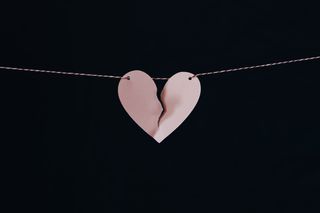Divorce
Contemplating Divorce Amidst the Pandemic?
Thoughts on another type of house arrest.
Posted April 18, 2020

We’ve all heard comparisons made between the current pandemic and the tragedy of 9/11 and the economic crash of 2008. Particularly in the midst of them, these societal crises have exerted a strong grip on our every move, decision, conversation, and activity. They have catapulted us into waves of individual and collective anxiety and grief. This creates a stranglehold on our psyche—both our individual and collective psyche.
As a sociologist, I am interested in how seemingly private troubles are indeed public issues of the social structure. What happens in our individual lives sends ripple effects out into the larger society and what happens globally sends shock waves back into our own homes, our families, and our intimate relationships.
There is much to consider when we think about how this global pandemic is sending shock waves across our dining tables, into our bedrooms, and into our intimate lives. We can feel it in terms of presence and in terms of absence.
Single people who want to date may see this possibility come to a screeching halt; singles may also feel cheated out of getting to know someone better whom they had just become acquainted with before the lockdown; couples in which one or both are in the medical field may now feel apprehensive about physical and sexual intimacy; people who are partnered but not living together may be reconfiguring that arrangement; people on the cusp of a serious commitment may have accelerated things and find themselves living together, either by choice or some other circumstance, where such sudden intimacy may be followed by disillusion; some may be having fleeting or longstanding affairs and trying to negotiate how to even manage that complexity in the context of a lockdown; some may have a partner with disabilities or a chronic illness and are tasked with caregiving that is further complicated by the pandemic; and others may be recently widowed and struggling with loss and loneliness.
And still others may be couples nearing the brink of a breakup or divorce, or contemplating it, and now find themselves cooped up together because of lockdowns during the pandemic. It is this last one that I want to discuss here in more detail.
When people are unhappy in their intimate relationships and feel confined and stifled, stuck and stagnant, they can also feel trapped. Sometimes that results in the decision to take time apart or split, but while separation and divorce are often arduous work and take their toll emotionally, financially, and physically, it is most likely doable, with the exception of abusive relationships of course that can make leaving particularly dangerous. The point is that under non-pandemic circumstances, people can exit an undesirable relationship more freely, even when leaving is often undeniably hard. One might feel stuck, certainly. But, in a pandemic with strict lockdowns, one is stuck.
An unhappy relationship in which people feel trapped can feel like living inside a homemade jail. But, during a lockdown, and when places for pursuing pleasure and joy are also largely unavailable, it’s the feeling of a homemade jail nestled in a large federal prison.
With a global pandemic creating economic disaster on a scale we can still barely comprehend, it’s much more likely that couples will be residing together not just while they are coming to terms with a divorce on the horizon but living together after the separation or divorce. Much of this will be out of economic necessity.
I get it. Many, though not all, aspects of global, national, and local events careening out of control and barreling into the home and a marriage are familiar to me. I offer my personal experience with this with the hope that it speaks to readers’ concerns and questions. Even if we are the ones who have initiated a divorce, a lot can feel out of our hands and there are the helpless and hopeless feelings, and the impatient questions we ask ourselves like, “How and when will this ever end?” “How and when will I get my life back?” “How and when am I supposed to move on?” When so much feels out of our control, there is a loss of human agency that is essential to people feeling their lives are manageable and their own.
I was in a tenure-track job at a college in Boston from 2008-2010 as it was financially unstable and on the brink of collapse. Simultaneously, so was my marriage.
Yet, my ex-husband, Mark, and I remained in the same house together for two years after I asked him for a divorce. We had to. I did not yet have a new job and was looking all around the country for work. I really did not want to have to move twice—once to move out and once more for a new tenure-track position. And, Mark needed the money that I would be giving him by continuing to split the household expenses.
We lied to the judge at our divorce proceedings. We said I would be moving out much sooner. So, even after going to court in 2010, I did not move out until 2012. This means we lived together through three wedding anniversaries while broken up. We even continued to sleep in the same bed since we only had one in the house, and we weren’t about to use money we did not have to buy more furniture. But we had sworn off sex and any sort of fooling around. During those years, we occasionally gave each other a hug or held hands, but those gestures didn’t carry passion as much as they carried care. And they carried the weight of a history together and a completely uncertain future. Mark and I were committed to having a kind divorce, a divorce where what is said and what is remembered is filled with decency, integrity, compassion, and hope. Doing that helps a lot.
Nevertheless, we were still faced with the reality of living together knowing full well it was no longer going to be forever. This was a man who had been an enormous part of my life for 16 years, who was woven into the fabric of my family, with whom I bought my first house that we gutted and renovated together. While some couples claim they want to kill each other during a renovation, we managed to find the process creative and fun; we were able to salvage and make beautiful a structure in desperate need of repair and tender loving care, yet were ultimately unable to do the same for our marriage.
There is something unusually sad and lonely about living inside a relationship that feels nearly over. That’s a pretty universal experience most of us have had if we have been in and fell out of love. That feeling is entirely magnified when the end of the relationship involves living in the same dwelling out of economic necessity that are the consequences of much larger societal crises.
Most people have commented on how time has felt warped in this pandemic, where things that happened last month feel like many years ago. Time is exponentially distorted when you’re still living with your ex after a divorce. Perhaps it’s because you’re living out something still so firmly rooted in the past yet teetering on the future. That kind of stuckness is more than sad; it hurts to the bones. It’s not just stuckness, but an antsy, anxious stuckness. During this pandemic, people seem to be longing for aspects of the past they didn’t realize they enjoyed so much, even very mundane, daily stuff, all while speculating about what the future will hold for them individually and for the larger culture. There’s a sense of being uneasy, unsteady, unmoored. As it turns out, approaching a divorce or living with your ex-partner post-divorce produces those same feelings.
For couples who were already contemplating divorce before the pandemic or where the experience of sheltering in place confirms the desire and need to pursue a divorce, the challenge is to care for one’s mind, heart and body in ways that might feel more challenging now. In the months before I expressed to Mark that I needed a divorce, I relied on daily five-mile walks around Lake Waban in Wellesley. Before I moved out of Massachusetts, I took many photos there that I later enlarged, framed, and hung in my current home. They remind me of all my meanderings and how I found my way. They remind me of the strength and flexibility in nature that I try to cultivate in myself. They remind me of how nature can save us, even from ourselves. And, they remind me of the crooked path of grief and how I learned to come home to myself. In this current moment with so many closures, it becomes imperative to find spaces and places, inside and outside, that are yours alone for reflection and searching.
The process of divorce is filled with grief because it’s a sort of death. It’s the death of a family unit, a structure, a way of being, a way of having a self in the world. So much needs to be reconfigured physically and reimagined psychically. There is no denying how hard, lonely, and confusing it is to grieve the loss of an important intimate relationship. And all of that is compounded in this intense time of global grief and uncertainty. It’s like living in concentric circles of wild, raw, unrelenting grief. Individual and collective grief both shake us to our core, calling on us to pay attention to what matters, to bear witness to pain. Yet both also stretch us to do something else that is always worth doing—thinking about what home means, how we make a home, how confined or free we feel in our home, and how to come home to ourselves again and again.
An earlier version of this post appeared in Culturico on April 12, 2020.




